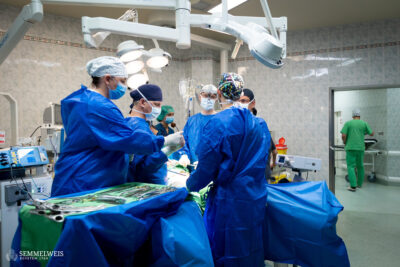 “It’s understandable that no one is willing to spend long hours in the kitchen during exam period; however, it is important for young people to avoid fast foods low in nutrients, as maintaining a healthy diet is crucial for proper brain function,” says dietitian Dr. Zsanett Bodor.
“It’s understandable that no one is willing to spend long hours in the kitchen during exam period; however, it is important for young people to avoid fast foods low in nutrients, as maintaining a healthy diet is crucial for proper brain function,” says dietitian Dr. Zsanett Bodor.
The assistant professor of the Department of Dietetics and Nutritional Sciences at Semmelweis University emphasizes the need for five meals a day and adds that breakfast is crucial for all-day studying, as it provides the body with enough energy to start the day. This is of particular importance in the case of increased brain workload, since the brain uses glucose as a source of energy, which it provides from the nutrients it ingests. Wholegrain pastries and breads, as well as high-fiber fruits and vegetables are also ideal as they provide a more balanced blood sugar level compared to foods containing fast-absorbing sugars. For this very reason, it is advisable to avoid foods and drinks with high added sugar, such as sugary drinks, energy drinks, and cakes, and choose naturally sweet fruits instead.
In addition to the three main meals, students should not skip morning or afternoon snacks either; however, junk foods, such as chips or chocolate, should be avoided, except for one or two squares of at least 70 percent cocoa dark chocolate.
For snacks, it’s worth choosing foods that have the right nutrients for cognitive processes, such as natural yogurt with oatmeal, or apples and pears with wholegrain, high-fiber cookies.
The expert also points out that omega-3 fatty acids in nuts, such as walnuts, hazelnuts, and almonds, can boost brain function, but these should be consumed unsalted and only a few times a week, in small amounts (small handfuls), due to their high energy content. It is common for students in the exam period to be more sedentary, so their energy needs may be lower compared to a more active period. The assistant professor recommends that students opt for lower-fat alternatives, such as chicken and skimmed dairy products, during this period. Besides animal protein, it is advisable to consume dried legumes at least once a week, such as lentils, beans, or even soy.
Concentration is also influenced by hydration, the dietician explains. You need to drink eight glasses of liquids a day (200-250 ml per glass), of which at least five glasses should be water. The daily liquid intake also includes the water content of foods eaten during the day, such as soups or smoothies.
During exam periods, many examinees study late into the night and try to stay alert by consuming too much caffeine. However, Dr. Zsanett Bodor warns that the daily intake of 400 mg of caffeine (3-4 cups of coffee) recommended by the World Health Organization (WHO) is not to be exceeded. Other caffeine-loaded drinks besides coffee include black, white, and green tea and energy drinks, which can have a stimulating effect quickly after consumption and can also activate memory. However, tea and coffee should be alternated, as the tannin in tea decelerates caffeine absorption, thus the stimulating effect lasts longer. Excessive consumption may reverse these positive effects, though: not only can you become dehydrated (due to the diuretic effect), but you may also experience heart palpitations, headaches and, if consumed late, insomnia, although a restful sleep is essential for learning.
Meal plan
Breakfast: wholegrain bread, vegetable spread, high-meat, low-sodium cold cuts, low-fat cheese; vegetables, or porridge with fruit and yogurt
Morning snack: an apple, or a few pieces of wholegrain crackers, or a fruit smoothie
Lunch: vegetable soup, fried chicken breast or fish, boiled or steamed brown rice, or steamed vegetables or salad
Afternoon snack: yogurt with fruit
Dinner: scrambled eggs with wholegrain bread, vegetables
Orsolya Dávid
Translation: Judit Szabados-Dőtsch
Photos by Bálint Barta – Semmelweis University; iStock


